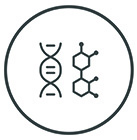Clinical Trials | Overview

Our Hematopoietic Cell Transplant Program offers unique access to a range of clinical trials for children with rare or hard-to-treat conditions. Our clinicians work collaboratively with national research groups, including the Children’s Oncology Group, the Blood and Marrow Clinical Trials Network and the Pediatric Blood and Marrow Transplant Program, to develop innovations and expand transplantation for new conditions.
 |
Latest clinical trials |
-
Dyskeratosis congenita is a disease that affects numerous parts of the body, most typically causing failure of the blood system. Lung disease, liver disease and cancer are other frequent causes of illness and death. Bone marrow transplantation (BMT) can cure the blood system but can make the lung and liver disease and risk of cancer worse, because of DNA damaging agents such as alkylators and radiation that are typically used in the procedure. Based on the biology of DC, we hypothesize that it may be possible to avoid these DNA damaging agents in patients with DC, and still have a successful BMT. In this protocol we will test whether a regimen that avoids DNA alkylators and radiation can permit successful BMT without compromising survival in patients with DC.

NCT01659606 
Recruiting children and adults up to 65 Years (full eligibility criteria) 
Boston Children's Hospital 
Started: July 2012 
Principal investigator: Suneet Agarwal, MD. PhD, Sub-Investigator: Leslie Lehmann, MD, PhD 
Contact: Suneet Agarwal, MD. PhD at 617-919-7579 or suneet.agarwal@childrens.harvard.edu
-
Acute Graft versus Host Disease (aGvHD) is the most deadly complication facing children who have allogeneic hematopoietic stem cell transplant (HSCT). aGvHD occurs, in large part, because the T cells in the bone marrow graft do not "accept" the presence of the transplant recipient's cells, and mount a severe, debilitating, and often deadly attack against the recipient, striking the skin, the liver, and the gastrointestinal track, most prominently. For patients receiving bone marrow from an unrelated donor, the rate of aGvHD can reach as high as 80%, with up to half of patients dying from this complication. These serious outcomes occur despite our best efforts at aGvHD prevention. Given the lack of success in preventing aGvHD with current therapies, novel therapies to prevent this disease are desperately needed.

NCT01012492 
Recruitment status: Completed 
Boston Children's Hospital 
Last Update Posted : Jan. 21, 2019 
Principal investigator: Leslie Lehmann, MD, PhD 
Contact: No longer recruiting -
This is a prospective non-therapeutic study, assessing the long-term toxicity of pediatric HCT for hematologic malignancies. This study is a collaboration between the Pediatric Blood and Marrow Transplant Consortium (PBMTC), the Center for International Blood and Marrow Transplant Research (CIBMTR), the National Marrow Transplant Program (NMDP) and the Resource for Clinical Investigation in Blood and Marrow Transplantation (RCI-BMT) of the CIBMTR. The study will enroll pediatric patients who undergo myeloablative HCT for hematologic malignancies at PBMTC sites.
The study examines the hypothesis that survivors of pediatric HCT are at risk for late organ toxicity and they will have identifiable biomarkers present within the first two years following HCT which will be predictive for late adverse outcomes allowing for early identification of patients at risk.

Natural History and Biology of Long-Term Late Effects Following Hematopoietic Cell Transplant for Childhood Hematologic Malignancies 
Active, not recruiting 
Dana Farber/Boston Children's Cancer and Blood Disorders Center 
Started: March 2015 
Principal Investigator: Christine Duncan, MD 
Contact: no longer recruiting
-
This trial will assess the efficacy and safety of autologous CD34+ hematopoietic stem cells, transduced ex-vivo with Lenti-D lentiviral vector, for the treatment of cerebral adrenoleukodystrophy (CALD). A subject's blood stem cells will be collected and modified (transduced) using the Lenti-D lentiviral vector encoding human adrenoleukodystrophy protein. After modification (transduction) with the Lenti-D lentiviral vector, the cells will be transplanted back into the subject following myeloablative conditioning.

A Phase 2/3 Study of the Efficacy and Safety of Hematopoietic Stem Cells Transduced With Lenti-D Lentiviral Vector for the Treatment of Cerebral Adrenoleukodystrophy (CALD) 
Active, not recruiting 
Dana Farber/Boston Children's Cancer and Blood Disorders Center 
Started: July 2013 
Principal Investigator: Christine Duncan, MD, and David Williams, MD 
Contact: No longer recruiting
This study is an open-label, controlled, multicenter, international, Phase III, randomized study of transplantation of NiCord® versus transplantation of one or two unmanipulated, unrelated cord blood units in patients with acute lymphoblastic leukemia or acute myeloid leukemia, myelodysplastic syndrome, chronic myeloid leukemia or lymphoma, all with required disease features rendering them eligible for allogeneic transplantation.

NCT03852498 
Recruiting children or adults12 to 65 Years (full eligibility criteria) 
Dana Farber/Boston Children's Cancer and Blood Disorders Center 
Started: July 2013 
Principal Investigator: Corey Cutler, MD 
Contact: Corey Cutler, MD, at 617-851-2852 or cscutler@partners.org
-
This is a prospective, multi-center, controlled, randomized, non-inferiority study to evaluate the clinical effectiveness of Conventional versus Mirasol-treated apheresis platelets in subjects with hypoproliferative thrombocytopenia who are expected to have platelet count(s) ≤ 10,000/μL requiring ≥ 2 platelet transfusions.

NCT02964325 
Recruiting children and adults (full eligibility criteria) 
Boston Children's Hospital 
Started: Nov. 2016 
Principal Investigator: Steve Sloan, MD, PhD 
Contact: Steve Sloan, MD, PhD, at 617-355-6268 -
This is a multicenter prospective collection of leftover respiratory tract secretions, paired blood and NP swabs, and clinical circumstances from pediatric HCT patients, followed by next generation genomic sequencing, transcriptome analysis, protein biomarker measurement, and statistical modeling.

NCT02926612 
Recruiting children and adults up to 21 years old (full eligibility criteria) 
Dana Farber/Boston Children's Cancer and Blood Disorders Center 
Started: June 2016 
Principal Investigator: Christine Duncan, MD -
This study is to compare the efficacy and safety of defibrotide prophylaxis in addition to best supportive care versus best supportive care alone in the prevention of hepatic veno- occlusive disease (VOD) in adult and pediatric patients undergoing hematopoietic stem cell transplant who are at high risk or very high risk of developing VOD.

NCT02851407 
Recruiting children and adults 1 Month and older (full eligibility criteria) 
Dana Farber/Boston Children's Cancer and Blood Disorders Center 
Started: Sept. 2016 
Principal Investigator: Leslie E. Lehmann, MD -
Researchers are working on ways to treat SCID patients who don't have a matched brother or sister. One of the goals is to avoid the problems that happen with stem cell transplant from parents and unrelated people, such as repeat transplants, incomplete cure of the immune system, exposure to chemotherapy, and graft versus host disease.
The idea behind gene transfer is to replace the broken gene by putting a piece of genetic material (DNA) that has the normal gene into the child's cells. Gene transfer can only be done if we know which gene is missing or broken in the patient. For SCID-X1, gene transfer has been done in the laboratory and in two previous clinical trials by inserting the normal gene into stem cells from bone marrow. The bone marrow is the "factory" inside the bones that creates blood and immune cells. So fixing the gene in the bone marrow stem cells should fix the immune problem, without giving chemotherapy and without risk of graft versus host disease, because the child's own cells are used, rather than another person's.

NCT01129544 
Active, not recruiting 
Boston Children’s Hospital 
Started: May 2010 
Principal Investigator: Sung-Yun Pai, MD 
Not recruiting
-
The investigators want to study if lower doses of chemotherapy will help babies with SCID to achieve good immunity with less short and long-term risks of complications after transplantation. This trial identifies babies with types of immune deficiencies that are most likely to succeed with this approach and offers them transplant early in life before they get severe infections or later if their infections are under control. It includes only patients receiving unrelated or mismatched related donor transplants. The study will test if patients receiving transplant using either a low dose busulfan or a medium dose busulfan will have immune recovery of both T and B cells, measured by the ability to respond to immunizations after transplant. The exact regimen depends on the subtype of SCID the patient has.

NCT03619551 
Recruiting children up to 2 years (Full eligibility criteria) 
Boston Children’s Hospital 
Started: Aug. 2018 
Principal Investigator: Sung-Yun Pai, MD 
Contact: Sung-Yun Pai, MD, at 617-919-2508 or sung-yun.pai@childrens.harvard.edu
